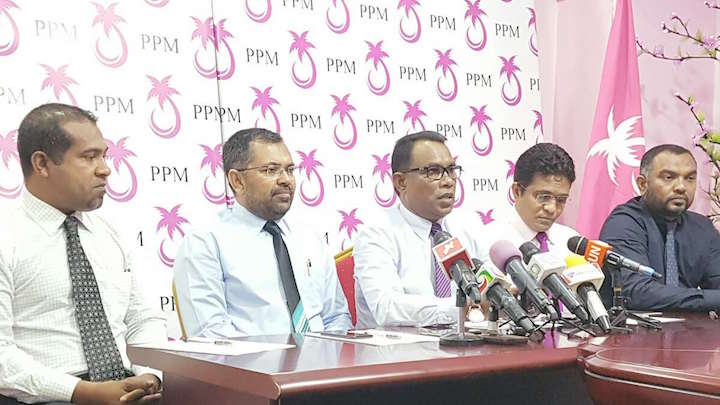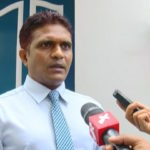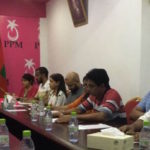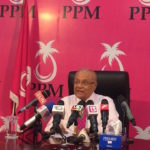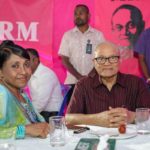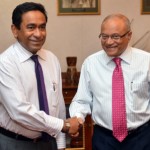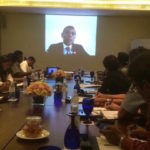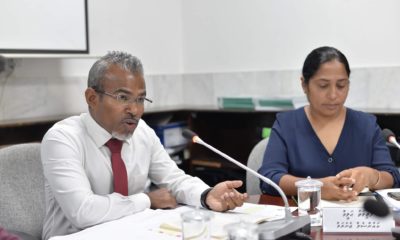The parliamentary group of the ruling Progressive Party of Maldives has backed controversial plans by the government to bar soldiers from voting.
MP Abdul Raheem Abdulla told the press on Thursday that the party welcomes the move as a step towards “establishing a military that is free of all political influences and to make sure [soldiers] are not affected by politics.”
Defence Minister Adam Shareef Umar announced Tuesday that the government has decided to abolish article 20 of the Armed Forces Act, which assures the right to vote for servicemen and women in the Maldives National Defence Force.
The PPM controls a comfortable majority in the 85-member parliament.
Speaking at Thursday’s press conference, Tourism Minister Moosa Zameer said the government will seek technical assistance from the attorney general before proposing the legal changes.
He stressed the importance of having “a neutral military force”.
Majority Leader Ahmed Nihan also contended that the changes are necessary to ensure public confidence in the military, insisting that the party is working “genuinely with honest intentions” for the good of the military.
“This is not an issue for debate. More developed countries advocating for high-level human rights have also faced such matters,” he said.
The government’s plan to disenfranchise soldiers drew widespread criticism last week with opposition parties contending that it was prompted by the lack of support within the military for President Abdulla Yameen.
But PPM MP Ali Arif dismissed the criticism as unfounded.
“We have the largest support from members of the military and police. If any such changes are expected to have an adverse effect, we will face the worst of it. But we are ready to pursue this on a national interest,” he said.
Soldiers were barred from voting before the armed forces law was passed along with the new democratic constitution in August 2008, which guarantees the right to vote for all Maldivians above 18 years of age.
Following the announcement last week, former Presidents Maumoon Abdul Gayoom and Mohamed Nasheed insisted that soldiers should have the right to vote.
“[MNDF] personnel are heroes who stand guard over our sovereignty. Don’t deprive them of their electoral rights!” Gayoom tweeted.
“The Maldivian military play a big role in building the nation and ensure the safety and security of the people. They should be able to vote,” tweeted Nasheed.
Gayoom’s son MP Faris Maumoon suggested that the majority of lawmakers would not support disenfranchising soldiers or police officers. “It will be difficult to pass any changes to infringe that right,” he said.
The Maldivian Democratic Party also issued a statement on Wednesday vowing to stage protests to block any attempt to push through the proposed changes. The minority party in parliament has 21 seats.
“We see this as a direct attempt to infringe on the electoral rights of the people, in a scheme to hold onto power through force. The move to bar soldiers from voting will be followed by similar measures on other state institutions,” the main opposition party warned.
In August last year, the MNDF barred soldiers from meeting politicians, including ministers, and foreigners without prior permission. The move came amidst heightened tension in Malé after a newly formed opposition coalition vowed to remove the president over the Maldives’ biggest corruption scandal.
In late August, eight soldiers were also detained at the military barracks on charges of canvassing for support within the MNDF for Yameen’s ouster. Four soldiers were later dismissed and placed under investigation
Shortly after Yameen’s inauguration in late November 2013, nine high-ranking officers were fired over accusations of sowing discord within the military ahead of the presidential election.
Several soldiers had signed a letter expressing concern about the delays in concluding polls by the end of the presidential term on November 11. After the letter was leaked online, the MNDF amended its regulations to punish officers who promote “upheaval and chaos.”

